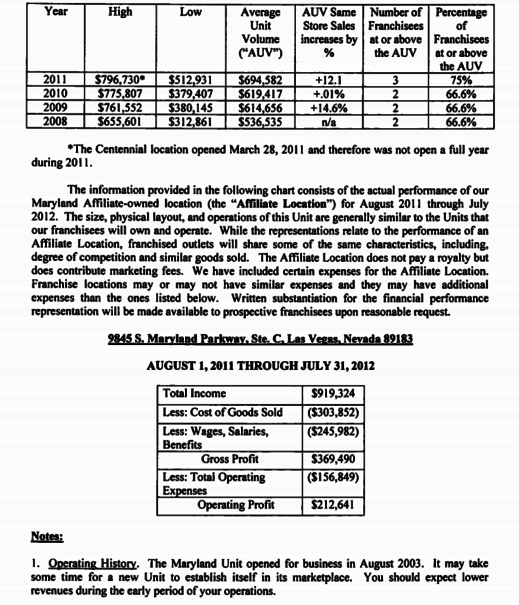
One of the important findings in behavioral economics is the discovery of "anchoring". Anchoring is responsible many poor financial decisions and this is how it works in franchise sales.
Science has discovered that when we are presented with an estimate or percentage measure from a population that we know nothing about, we tend to anchor on the estimate and act as if it was true -even though we understand that we have no real knowledge.
Here is an example, from a QSR interview and Teriyaki Madness, which states how much you can make with Teriyaki Madness.
"He says that not only are potential franchisees attracted to the impressive numbers operators are pulling off--including an average 23 percent same-store sales increase; AUVs of $855,000; and profitability of 16-21 percent--but also to the uniqueness of the concept, which combines Asian flavors with healthy items."
Now you and I have no idea whether the AUV is correct, what the average is based upon, or how "profitability" was calculated. However, the science says that you will anchor on these numbers and act is if they were true - despite not knowing what the Item 19 actually stated.
You will also notice that this claim made in an interview could not be compliant if it were an ad - the required disclaimer about how many units achieved that AUV is not present. QSR can make this claim on behalf of Teriyaki Madness only if the interview is not a paid advertorial.
So for fun, let's take a look at the numbers behind the claim.
This is from Terriyaki Madnesses' 2012 FDD - and things could have changed by then. Even so, the real numbers are revealing.
Teriyaki Madness Item 19 (2012)
We have provided the following information: the high and low annual gross revenue information for each year that the franchised locations were open; the average same store sales percentage increases for each year; the average unit volume of the group for each year; and the number and percentages of franchisees that met or exceeded the average unit volume for each year.
For 2011, four (4) Teriyaki Madness restaurants were in operation for the entire year and for the years 2008 to 2010 only three (3) Teriyaki Madness restaurants were open for the entire year.
The financial picture disclosed in the Item 19 looks very different from the rosy picture described in the QSR article. We find out that we have reporting only from 4 units, and two of those units had an AUV between $380,000 and $615,000 for the three years 2008-2010.
A new store would likely face a similar ramp up period.
Even the reported high is less than the AUV reported in the QSR story, compare $796,000 to an AUV of $855,000.
Further, the profitability story is taken not from a franchisee store but a company or affiliate store.
All of the reporting is designed in the writers minds to paint the glossiest story that he or she can tell - but, a smart reader like you knows to go beyond the anchoring effect, read for youself the Item 19, request the back-up for the Item 19, and then come to a more realistic conclusion.
To Read more of Michael Webster's articles, Please Click Here.



Item 19 FPRs require a reasonable basis and franchise buyers should ask for the back up upon which the FPR is based.
If it doesn't make financial sense to buy the franchise move on.
Great article, Michael.
This is a franchisor who obviously thinks that having an Item 19 FPR is a license for unlimited earnings claims.
Check out:
http://franchise.teriyakimadness.com/
What do you think of these quotes from the franchisee in the video?
“I started in 2006-2007 with the first store, in 2011 I built my second establishment… every year we grow… it’s pretty consistent… We have consistent growth over five years… This particular store, this year, we’re looking at doing over a million… my first store does over $800,000 (It used to do $400,000 five years ago)…”
“We never have a bad day, we always have a good day…”
“Our first month we did over $120,000 in sales… We were projecting maybe $60,000… 2nd month, third month followed the lead… on the 4th month, pretty much, I had the store paid for… I was totally shocked… ”
“Since then, we do $80,000 – $90,000 consistently every month… I couldn’t have guessed that it would be this easy…”
Sean;
Thanks, yes this is the sort of marketing which is going to leave the wrong impression.
To put out a profitability number for a location that doesn't pay royalties is not helpful.
Further, the claim that for $225k, you can get $224k in profit is misleading -and needs substantial qualification.
I less concerned with their website because no one is visiting it than I am with the shoddy reporting by QSR. Would it have killed them to do some reporting and find the actual Item 19?
Sean and Michael -
It used be the now defunct Chain Leader Magazine that was the advertorial franchise sales promotion distributor of non-compliant FPRs or Earnings Claims.
It seems QSR Magazine has picked up where Chain Leader left off in performing this service of franchise profitability promotion that a franchisor doesn't include in its Franchise Disclosure Document and Item 19 Financial Performance Representation.
What's annoying is CEOs and VPs of franchisors know that this activity is improper, inappropriate and reckless, yet they still do it.
And these franchisor leaders are obviously not sharing this potentially legally devastating franchise marketing tactic with their franchise attorneys before they do it.
Now using your Item 19 FPR in marketing is a great idea! Just be certain to include the required disclaimer language in the advert.
Franchisors with the better franchisee business models should attract more qualified franchisees with talent and capital. And proving your franchise is more investment worthy than your competitors is the way to do it.
I had a Battle Royale with several of these publications regarding their hyping of Beautiful Brands. While I found QSR to simply be reprinting what it was provided, Fast Casual, I believe, is more involved with the process. Here's what Fast Casual just wrote:
"The Las Vegas-based concept specializing in fresh, made-to-order Teriyaki dishes, recently signed a deal with 20 new franchisees to open units all over the country. The new agreements will result in almost 100 percent growth and are just part of Arreola's strategy to have more than 100 open units in the next five years. So far, his strategy seems to be working, as the concept boasts an average 23 percent year-over-year, same-store-sales growth among franchisees. With an investment of $225,000 to $358,000, Teriyaki Madness has average unit volumes of $855,000 and profitability of 16 percent to 21 percent, Arreola said. In fact, the success of the current franchisees has inspired each to pursue additional stores."
This reads just like the BBI hype. How many TM locations are open? QSR implies fewer than 10, yet Fast Casual says 20 new units represents "almost 100 percent growth." When they avoid stating what's been accomplished but are very specific about future openings, something's fishy.
Sean, if these articles are bought and paid for advertorials, then such claims may violate the FTC Rules on blogging, advertorials and disclaimers.
I want to correct the impression that Sean left re Chain Leader promoting possibly inaccurate financial info from franchisors.
As senior editor for the publication for 12 years, I wrote many stories about franchisors.
I don't think I ever took at face value (let alone source a press release) a franchisor's unit-level financials without attempting to
verify them via the FDD (or UFOC) or a franchisee.
And if I could not, I'd say so.
I don't think anyone else on the editorial side did, either, though it's
hard to be certain. I do know none of the editorial staff ever consciously
promoted a franchise or was persuaded to share numbers that could not be
verified.
Did franchisors buy advertorial space from our salespeople to puff up their
numbers? I bet they did. But funny thing I never read those advertorials.
We tried hard to keep separate church and state. The advertorials in any case were written by separate marketing staff, which is typical in large publishing companies.
If Sean is in fact citing advertorials in his comment he might realize that whatever their impact they're no different than a product manufacturer's ad claiming to boost kitchen productivity.
Maybe the product does; maybe it doesn't.
Caveat emptor.
David:
Actually Joe, not Sean, was the one who brought up Chain Leader.
I really liked Chain Leader and was sorry to see it go.
I think you missed Joe's point. Each of your CL profiles contained a little sidebar with the concept's AUV, average check, etc. Franchisors are not allowed to supply this information to prospective franchisees (even if accurate) unless they've documented it in the Franchise Disclosure Document via an Item 19 Financial Performance Representation (FPR). Including a reprint of your CL profile in their sales packet is one way franchisors cleverly disseminated non-compliant FPRs, seemingly inadvertently.
Advertorials were a more blatant way to sneak out illegal earnings claims, but at least they were designated as advertising.
I don't think Joe's criticism was leveled necessarily at Chain Leader, rather at how franchisors misused it to provide illegal earnings claims in a sneaky way.
Foodservice Equipment & Supplies provided extremely detailed costs and sales info, I recall, and I'm sure they had no intention to deceive either. But if franchisors furnish reprints with financial info to prospective franchisees, it's my understanding that it's the same as if they put them in their brochure copy. Lawyers?
Sean -
Well said and correct.
I don't know if reporters at trade publications like the former Chain Leader and active QSR, FSR Fast Casual, NRN, INC, Restaurant News, etc are providing a circumventing platform for franchisors to make and promote non-compliant Financial Performance Representation - FPRs inadvertently or intentionally.
I do know that franchisors/franchise sellers know exactly what the are trying to achieve.
Franchisors who do have an Item 19 FPR and those who don't should be mindful of mistakenly or blatantly violating FTC compliance rules.
I think we all agree if a franchisor gets an article published they and their 3rd party brokers/agents will re-distribute the article through their websites, in brochures, direct mail, at trade shows, emails and email blasts directed at franchise buyers?
And any redistribution absent the required FTC disclaimer is a violation and potentially misleading to franchise buyers.